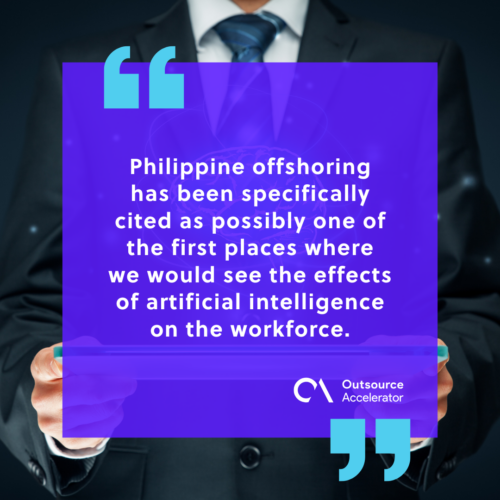How AI & WFH are Impacting the Outsourcing Office Market – with Morgan McGilvray of Santos Knight Frank

When outsourcing companies expand their teams, they also expand their physical space. But with both work-from-home (WFH) and artificial intelligence (AI) now shaping how outsourcing operates, what does that mean for commercial property demand?
To find out, Derek spoke with Morgan McGilvray, Head of Office Leasing at Santos Knight Frank, who has spent more than 15 years working directly with outsourcing firms in Metro Manila.
Impact of COVID-19 on offices
Morgan was formerly employed in the call center industry before finding his way into real estate, which at the time was on the verge of setting up the emerging BPO industry.
“I always like to define BPO as not just call centers but any kind of shared service or offshoring work in the industry.”
When the Philippines entered strict lockdown, office demand vanished almost overnight. As Morgan explained:
“Most of the offices were closed and remote work was the majority of all work… that absolutely killed office demand.”

Even when leases remained active, tenants simply weren’t using space they were still paying for.
“Companies were no longer using their office space… so at the earliest opportunity, a lot of them were trying to give back space.”
As offices slowly reopened in 2022, companies took a balanced approach with hybrid arrangements. Return-to-office became gradual, cautious — and highly competitive for talent retention.
“[The companies] didn’t want to rock the boat and bring [everyone] in for five days a week. They were very worried about losing staff to other firms who didn’t require everyone to come back in.”
Philippine office market
After years of slow demand, 2025 marked a major turnaround.
“This year, 2025, there seems to be a bounce back of notable proportions… the office market and demand for office space really is back again this year.”
Morgan shared fresh market numbers:
“Year to date, 2025, we show 610,000 square meters of office space taken up. And if you consider an office building to be about 40,000 sqm, we’re talking in the range of almost 14 or so full office buildings.”
He notes that since the pandemic ended, the tier one business districts like Bonifacio Global City and Makati were the first to open back up.
However, he also observes the problem of overbuilding, even in popular areas like Ortigas, considered a central business location.
“Developers tend to get a mentality of, ‘My building’s gonna be different and better and all the demand will come to it,’ and sometimes they’re right but sometimes they’re wrong about it.”
AI outlook
Artificial intelligence has found its way into nearly every industry at this point, even real estate. Morgan’s team continually looks for evidence on how it will affect the BPO industry, and by extension office spaces.
“The first thing we look at is headcount growth or shrinkage, announcements of layoffs or new hiring. The lagging indicator part is if headcounts are being reduced because of AI, then the office space will sometimes follow.”
From looking at the biggest firms, Morgan describes a “mixed picture.” While some of them continue to take large amounts of space, it’s also not uncommon to see big leases not being renewed.
All in all Morgan says it’s “netting out kind of even, [with] more or less no discernable pattern in either direction.”
He’s still keeping an eye out, as according to him:
“Philippine offshoring has been specifically cited as possibly one of the first places where we would see the effects of artificial intelligence on the workforce.”

Still, Morgan feels this trend will go as previous ones have gone.
“This concern goes back a long time, even before AI was the buzzword. We were concerned about automation removing Philippine offshoring jobs… and so we were kind of concerned what was going to happen to the voice work in this country.
And some of it did go away, but what happened [is] that offshoring and outsourcing went a lot higher up the value chain. And we started to get like healthcare BPO work and financial BPO and back-office legal and these other kinds of sectors, well beyond third party call centers.”
As it is, Morgan says that the “the formula for Philippine BPO is still quite strong.”
He observes that many firms, particularly from the US and Australia, are opening new offices in the Philippines.
“And that’s really encouraging because that’s hundreds of thousands of new jobs. It’s new office space. It’s really a big benefit to the market and to the industry here.”
For more inquiries about what Morgan does, you can visit Santos Knight Frank’s website. Morgan can also be reached at LinkedIn.
If you’d like to ask us anything about outsourcing or our BPO marketplace, feel free to reach out to ask@outsourceaccelerator.com.







 Independent
Independent




